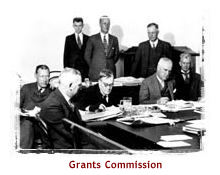 |
WA and Canberra
 In
spite of the general prosperity of the 1920s many Western Australians felt
their State hard done since Federation in 1901. People were quick to complain
of the disabilities they believed they had suffered. There were many instances
in which Western Australians had good reason to feel disadvantaged. During
nearly thirty years of Federation interstate free trade had allowed the
dumping of goods manufactured in eastern Australia at the expense of Western
Australian industries, Commonwealth protection of Queensland sugar had raised
local prices, federal arbitration had increased wage rates, and the Navigation
Acts had raised shipping freights. In
spite of the general prosperity of the 1920s many Western Australians felt
their State hard done since Federation in 1901. People were quick to complain
of the disabilities they believed they had suffered. There were many instances
in which Western Australians had good reason to feel disadvantaged. During
nearly thirty years of Federation interstate free trade had allowed the
dumping of goods manufactured in eastern Australia at the expense of Western
Australian industries, Commonwealth protection of Queensland sugar had raised
local prices, federal arbitration had increased wage rates, and the Navigation
Acts had raised shipping freights.
In the late 1920s Labor Premier Philip Collier took part in negotiations
between all State leaders which resulted in increased financial powers for
the Federal Government. These changes were necessary to help the Commonwealth
meet its increased responsibilities for war loans, pensions, rehabilitation
and soldier-resettlement following the First World War. Western Australians
approved this new Financial Agreement in the 1928 federal referendum, allowing
the Commonwealth to take over the management of public debts and to regulate
future debt through a Loan Council.
Since 1921 the Commonwealth Government had collected the State's taxes in
addition to its own. These were reimbursed to the State in addition to a
per capita payment and other special grants from the federal treasury for
the State's roads and soldier settlement. The new Financial Agreement changed
Commonwealth-State relations significantly with the Federal Government allocating
the amount each State would receive annually. As a small "claimant"
State with only 6 per cent of the Australian population, Western Australia
could receive more funding than under the old per capita payments, but a
good deal of the State's financial independence was surrendered.
The Loan Council restricted the ability of States like Western Australia
to raise capital in overseas markets like London. British capital had helped
finance the gold boom of the late 1890s as well as major development and
infrastructure projects such as the construction of railways and the Group
Settlement Scheme, undertaken between the wars. Western Australia would
remain a claimant State dependent on Canberra for the next forty years.
|
 |